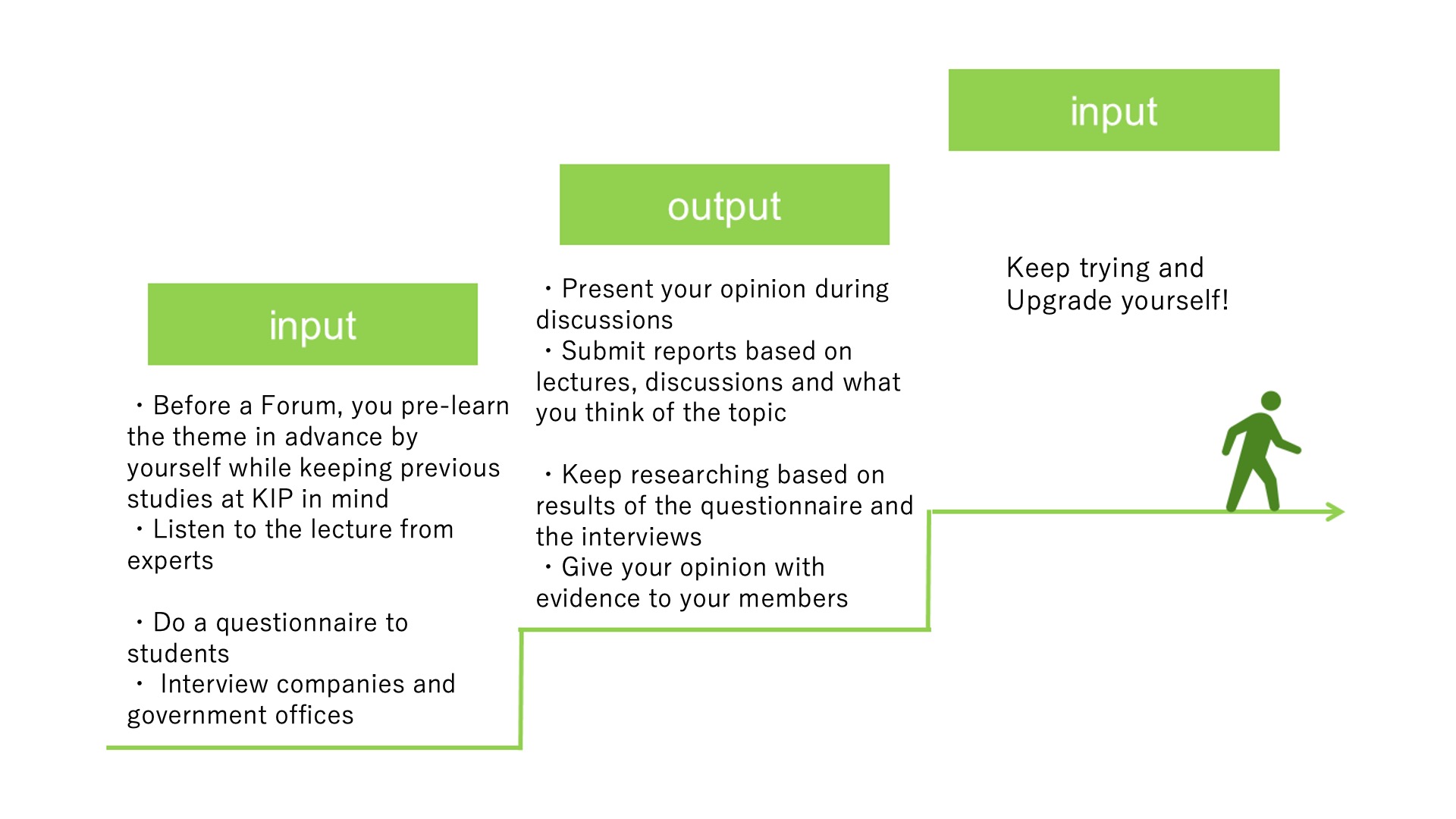About KIP
 Knowledge Investment Programs (KIP) is a discussion group which target is to nurture the Japanese youth to have a great knowledge of Japan and an international mindset. KIP is consisted of 50 alumni members, who are currently working in various fields in and outside Japan, approximately 70 undergraduate and graduate students in Tokyo area, and 10 from Gifu prefecture. As a general incorporated association, KIP has board of directors and other supporters with the same passion who have helped KIP become what it is today.
Knowledge Investment Programs (KIP) is a discussion group which target is to nurture the Japanese youth to have a great knowledge of Japan and an international mindset. KIP is consisted of 50 alumni members, who are currently working in various fields in and outside Japan, approximately 70 undergraduate and graduate students in Tokyo area, and 10 from Gifu prefecture. As a general incorporated association, KIP has board of directors and other supporters with the same passion who have helped KIP become what it is today.
Since its foundation, KIP tries to work as a bridge between universities and the society. It provides young generation in Japan with a chance to be exposed in both domestic and international social issues through discussions and to grow as an individual by practicing leadership through various activities.
In Japan, 切符(kip)means a ticket. Here, students get the “KIP” for entering the society.
In 2017, KIP celebrated its 10th anniversary. With this new milestone, we have set up a page on our future activity policy.
→ 10th anniversary
Principles
 Goal: “From ‘international-oriented’ person with scarce knowledge on Japan to ‘well informed Japan expert’ with an international mindset”
Goal: “From ‘international-oriented’ person with scarce knowledge on Japan to ‘well informed Japan expert’ with an international mindset”
Features
・Promoting young people to become globally minded, well informed experts.
:Learning deeply about Japan (and your own country), thinking about it in your own way, and then acting on your own ideas. Developing the ability to communicate your ideas to people overseas.
・Respecting Diversity as happened in the Edo Period "Terakoya" system
:Young people from various backgrounds are studying, sharing and teaching each other as an old style of terakoya. In this old style of teaching, students and teachers from diverse backgrounds will learn together.
・Enjoying extra time to study Liberal arts, as "Haste makes waste."
:Developing an attitude of finding indirectly useful ways to reach the goal.
Object
1. Fostering social and international awareness in students - Enlightenment of global and social awareness. Developing the "Habit of Thinking".
2. Learn about your country (Japan), think about it, and act on it. Fostering the ability to communicate overseas
3. Cultivation of mutual communication skills - Ability to listen, how to ask and answer questions appropriately, and ability to summarize
4. Fostering social skills through "courtesy to others," "respect for others," "attitude of gratitude".
5. Leadership development
6. Activation of "curiosity"
Contents
| Members' University | Various universities around Tokyo |
| Alumni Professions | Foreign & Domestic Financial firms, banks, Trading company, Local government, Consulting Firms, Journalism, Broadcast ...etc |
| Total Members | 80-100 members |
| Candidates | undergrad/grad students and post graduate Any university, major, age, nationality, and gender, is welcomed. |
| Venue | The Foreign Correspondents' Club of Japan, etc. |
| Annual Fee | 10,000Yen/year |
| Qualification | Youth who has Curiosity, Ambition and Devotion |
| Founding Date | January, 2008 |
| Founder/President | KIP Programs Representative. Keiko Packard |
Feature
Input-Output Cycle
KIP places emphasis on Input and Output through activities.
We think that we have to learn this method on a daily basis to be dignified Japanese who can get along with international society.
can get along with international society.
Also, we willingly accept international students based on the idea that they also need to know about Japan to “change from ‘visitor with no knowledge on Japan’ to ‘international person well-informed on Japan’ ,as Japanese do.
We believe that our members can grow through personal Input-Output ,repeatedly learning, thinking, and communicating on things, and organizational Input-Output, continuing many activities on themes.



